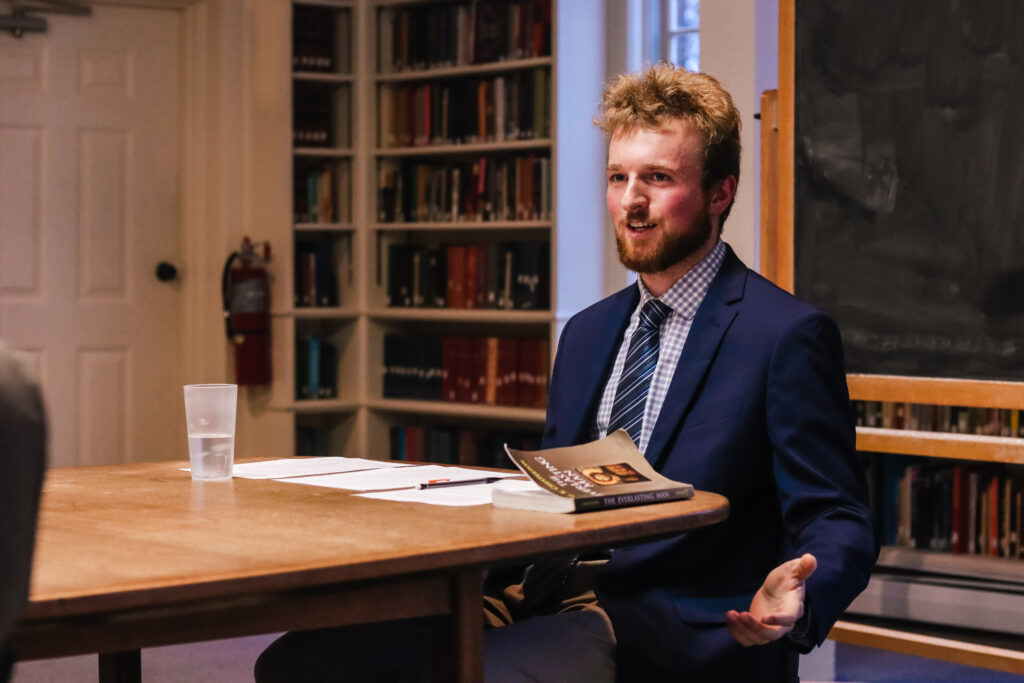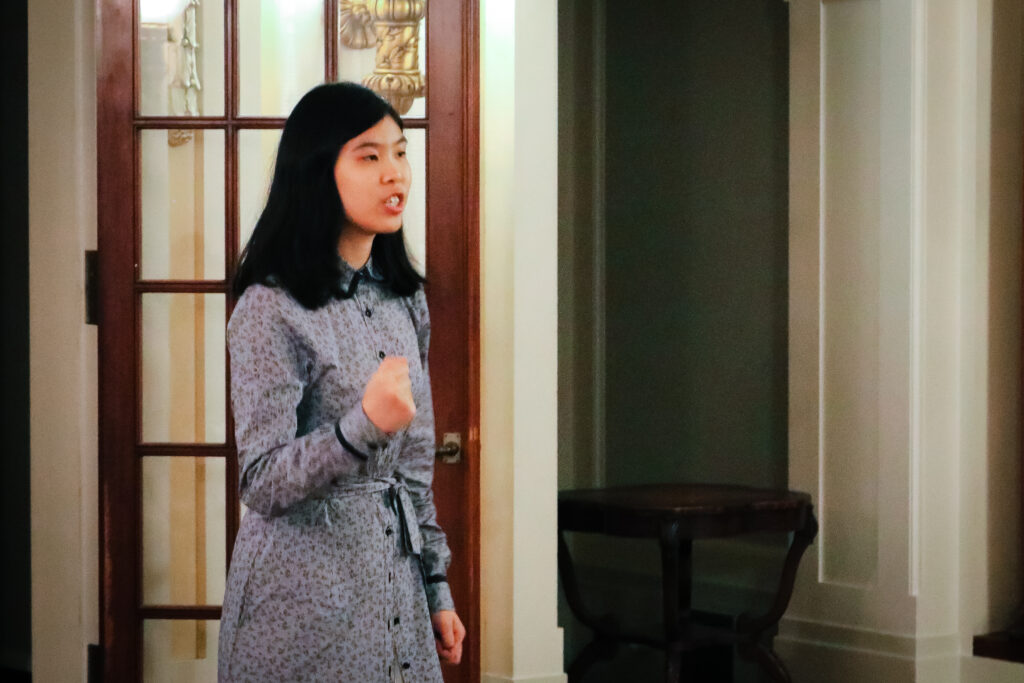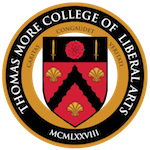By Cassandra Taylor, Publications Assistant
The end of each semester finds third-year students at Thomas More College preparing to deliver their Junior Projects, a capstone in the curriculum second only to the writing and defense of a Senior Thesis. Under the guidance of a faculty advisor, students select a great work and spend months delving into it. The preparation of an oral presentation delivered to three Fellows of the College is meant to help the student develop “skills of analysis, judgment, and exposition”—abilities that will serve students well when they deliver a public defense of their thesis the following year, and which carry over into their professional and personal lives.

The Junior Project provides the TMC student with an opportunity to pursue his or her specific interests within the College’s liberal arts curriculum. Selecting the work is not a choice that is taken lightly. For Gabriella Braaten ’25, who studied In the First Circle by Aleksandr Solzhenitsyn, it was important to choose “a book of an author whom I thought had a tremendous impact upon humanity. Solzhenitsyn fit that description.” Brendan McDonald ’25 knew that he wanted to study a text of G.K. Chesterton but needed to discern which one. “Orthodoxy, which describes Chesterton’s personal conversion to the faith, seemed too specific a topic for what I was looking to address,” Mr. McDonald said. “I’d heard great things about The Everlasting Man, some even ranking it above Chesterton’s most famous work. I read it over the summer and fell in love with it. In the work, he performs a historical analysis, refuting certain modern errors and presenting Christianity as the fulfillment of everything that came before it.” Lydia He ’25 had narrowed her selection down to three choices: The Red and the Black by Stendhal, Romance of the Three Kingdoms by Luo Guanzhong, and Ninety-Three by Victor Hugo. “All of these are works that provided me a deeper understanding of the history and spirit of their respective countries of origin, but don’t get nearly enough exposure in the Anglosphere,” she remarked. However, in the end Miss He chose Ninety-Three, “a work of great literary genius which deserves to be read,” because she felt most comfortable with Hugo and felt that it would help her prepare for studying the French Revolution in Humanities VII.

For each student, the Junior Project presents its own difficulties; these vary depending on the nature of the work in question. The shortness of time given for the presentation can also be a blessing and a challenge. For Miss Braaten, “The book’s sheer amount of text was formidable, but knowing that I only needed to focus on a particular aspect of it was reassuring.” Miss He found the experience to be “an exercise in the virtue of conciseness” as she wrestled with “the denseness and inaccessibility of the subject matter” while writing her presentation—which she enjoyed preparing for, even distributing supplementary historical materials to her audience. Mr. McDonald fought to find a way to “express something I don’t think can be put into words. The best I can say is that Chesterton’s style is first sensed before understood, and I found that to be the case for this work.”

“The most rewarding element of the process was knowing that, in my own small way, I was participating in Solzhenitsyn’s mission of teaching truth to posterity,” said Miss Braaten. “When holding the book in my hands, I often thought of how I was receiving the memories of the sufferings that millions endured in the twentieth century—memories that would have been lost or distorted had not Solzhenitsyn at the risk of his life preserved and revealed the truth to the world.” Miss He most appreciated the discussions she had with her faculty advisor. “I especially treasure the inspiring conversations I had with Mr. Thompson. Since I rarely come across anyone as enthusiastic about French literature as I am, it was exhilarating to finally be able to talk about it in such detail.” Mr. McDonald enjoyed the opportunity to come to a deeper understanding of the text he had chosen. “As with everything at Thomas More College,” he reflected, “the Junior Project heightened my understanding in a way I couldn’t even conceive of previously. The need to read a text several times over to grasp its meaning became ever more apparent as I delved further into it, as new meanings I’d missed revealed themselves.”
With their Junior Projects behind them, these students are now prepared to turn their attention to their Senior Theses over the coming summer. “Amid the other heavy classes of Junior year, the Junior Project is really like an intellectual holiday,” remarked Miss He in closing. “It enables you to practice for your Senior Thesis in a relatively comfortable environment, and thus its importance is not to be ignored.”
